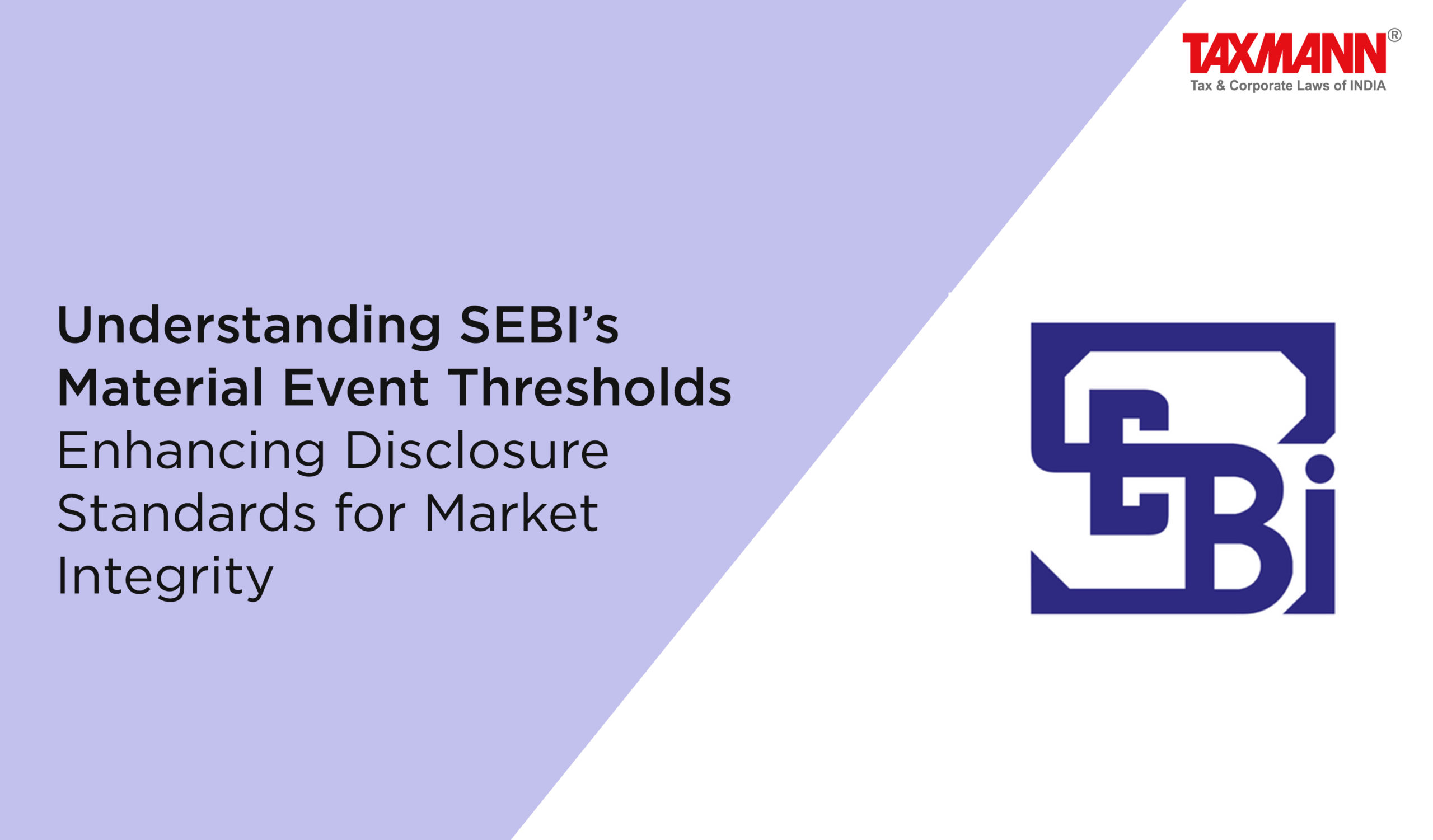Understanding SEBI’s Material Event Thresholds | Enhancing Disclosure Standards for Market Integrity
- Blog|News|Company Law|
- 2 Min Read
- By Taxmann
- |
- Last Updated on 14 July, 2023

Deepti Jambigi Joshi and Vallabh M Joshi – [2023] 152 taxmann.com 238 (Article)
I. Background
Regulation 30(1) of the Securities and Exchange Board of India (Listing Obligations and Disclosure Requirements), Regulations, 2015 [‘LODR Regulations’] requires listed entities to disclose material information to stock exchanges. Regulation 30(4) states the criteria that listed entities should see to determine what would be considered material information/event. Earlier barring certain events/information which were deemed to be material, the determination of whether an information is material or not was left to the listed companies. There was no specified threshold provided for considering information or event as material. Listed Companies were guided by provisions of Clause (i) of sub-regulation 30 (4) of LODR Regulations for determining what was considered material information.
II. Rationale of Amendment
In November 2022, SEBI issued a Consultation Paper for bringing transparency, objectivity and uniformity while disclosing material events or information specified under Regulation 30 of SEBI (Listing Obligations and Disclosure Requirements) Regulations, 2015 (“LODR Regulations”).
The Consultation Paper underlined the issue(s)observed by SEBI while disclosing the events specified in Para B of Part Aof Schedule III upon applying guidelines of materiality. It underlined the fact that many listed entities do not disclose events specified under Para B on the ground that they are not considered as material as per their Materiality Policy framed in terms of the criteria prescribed in regulation 30(4) of LODR Regulations.
Therefore, to bring uniformity in the Materiality Policy of Listed entities, SEBI proposed to introduce a quantitative criterion of minimum threshold for determining the materiality of information events for disclosure specified under Para B of Part A of Schedule III based on the value or the expected quantitative impact of the event.
The proposal was accepted andincorporated in LODR Regulations by way of SEBI (Listing Obligations and Disclosure Requirements) (Second Amendment) Regulations, 2023 (“the Amendment”). This Amendment shall be effective from July 14, 2023.
Click Here To Read The Full Article
Disclaimer: The content/information published on the website is only for general information of the user and shall not be construed as legal advice. While the Taxmann has exercised reasonable efforts to ensure the veracity of information/content published, Taxmann shall be under no liability in any manner whatsoever for incorrect information, if any.

Taxmann Publications has a dedicated in-house Research & Editorial Team. This team consists of a team of Chartered Accountants, Company Secretaries, and Lawyers. This team works under the guidance and supervision of editor-in-chief Mr Rakesh Bhargava.
The Research and Editorial Team is responsible for developing reliable and accurate content for the readers. The team follows the six-sigma approach to achieve the benchmark of zero error in its publications and research platforms. The team ensures that the following publication guidelines are thoroughly followed while developing the content:
- The statutory material is obtained only from the authorized and reliable sources
- All the latest developments in the judicial and legislative fields are covered
- Prepare the analytical write-ups on current, controversial, and important issues to help the readers to understand the concept and its implications
- Every content published by Taxmann is complete, accurate and lucid
- All evidence-based statements are supported with proper reference to Section, Circular No., Notification No. or citations
- The golden rules of grammar, style and consistency are thoroughly followed
- Font and size that’s easy to read and remain consistent across all imprint and digital publications are applied



 CA | CS | CMA
CA | CS | CMA
